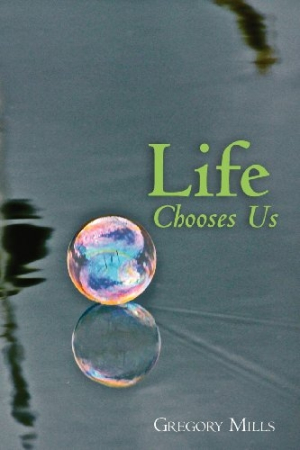Life Chooses Us
“This book is based on a true story,” states Gregory Mills at the start of his awkward autobiographical novel, Life Chooses Us. Mills’s purpose would have been better served had he written his book as a memoir—the nonfiction that it is. The basic story is so personal and painful that his attempts to fictionalize it fall flat.
Mills offers too much biased detail and presents too many specific opinions for this effort ever to reach its intended audience as a novel. In one instance, he provides a list of nineteen different antidepressants prescribed to his main character. The list contains the names of more drugs than most readers will ever recognize, yet these same readers cannot be expected to care. Occasional edification may be the byproduct of reading a novel, but few readers here will either anticipate or even want to encounter statistics within their casual reading.
Other valid, important information is also lost on the proper audience. Mills candidly states, “Indifference and misunderstanding of mental illness throughout society … is easily the most difficult aspect of sickness,” referring to the fate of “four and a half million Americans suffering from treatment-resistant depression.” Once again, the author’s information and personal experience belong in a better forum, one that could reach those impacted by the illness about which he writes. His novel is neither the proper venue nor an effective means of reaching those for whom this information is most relevant.
Mills’s writing also begs for good, solid editing . Between run-on sentences and fragments, the text is at points difficult to follow. Some delightful memories and side stories pop up occasionally, including one about an intriguing documentary called Paperclips, but their presence in the book is baffling in that they seem so out of context.
In addition, Mills often reverts to the passive “one” in his storytelling—as in, “one subscribes to genetic predisposition”—when a more active voice is needed. He also tends to qualify too many statements that need to be strongly stated. Hedging phrases such as “it seemed to,” “the nature of,” and “in all reality” abound, and “somewhat” appears multiple times in nearly every chapter. These qualifiers sap strength from both the characters and their positions in the story and serve only to weaken the portrayals of some immensely stalwart people.
“Through the course of our time,” says Mills, “we each do our best in imagining, choosing and crafting our lives. Ultimately, we are the sum of our experience, and in many unexpected and imperceptible ways, this life chooses us.” The author’s stated truth reflects his philosophy so very well that it guides his way throughout his writing. Life Chooses Us reveals his strengths admirably, but the book could be much more had he chosen to tell his own story as such.
Reviewed by
Cheryl M. Hibbard
Disclosure: This article is not an endorsement, but a review. The publisher of this book provided free copies of the book and paid a small fee to have their book reviewed by a professional reviewer. Foreword Reviews and Clarion Reviews make no guarantee that the publisher will receive a positive review. Foreword Magazine, Inc. is disclosing this in accordance with the Federal Trade Commission’s 16 CFR, Part 255.

